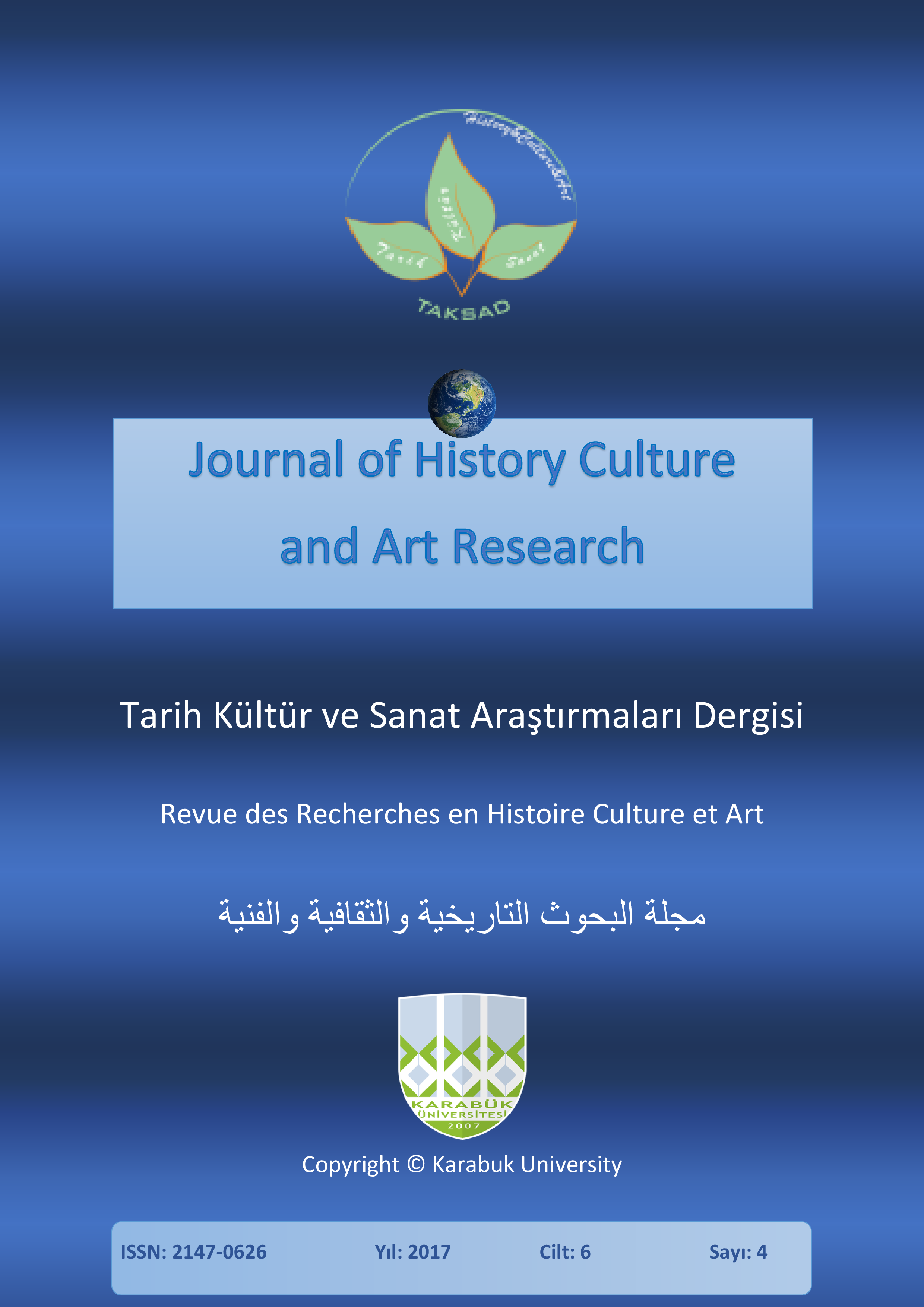"Friends" and "Foes" in the Social Space of the Tatar Ethnic Group
DOI:
https://doi.org/10.7596/taksad.v6i4.1162Keywords:
Eurasianism, Foe, Friend, Islamic fundamentalism, Jadidism, Tatars.Abstract
The history of the World Culture is a demonstration of the "war" between the two opposites: on the one hand, we see a trend towards unification of all aspects of life on a global scale, and on the other, there is a clear confrontation between different groups of mankind. Of the many causes of the disunity of the people, the authors' focus at the opposition "friend – foe" as a metaphysical principle of formation of social space wasn't chosen by accident. The fact is that any culture, in principle, is dichotomous, and the opposition "friend – foe" is the fullest incarnation of this dichotomy. As a universal principle of the formation and functioning of the cultures, it originally manifests itself in every one of them. And, as the authors of the study suggest: this opposition could either "work" in general on the cross-cultural cooperation and unity or be one of the confrontation sources. The main result of the study is that history has prepared and put forward the Tartars for carrying out a special mission, to unite peoples and cultures. But the revolutionary social upheavals that take place in the modern world pose a threat (in the circumstances of forced migration of peoples, the growth of national consciousness of the former Soviet Union space, and especially in the face of Islamic fundamentalism) on fulfilling this function.
References
Ankerl, G. (2000). Global communication without universal civilization. INU societal research. Vol.1: Coexisting contemporary civilizations: Arabo-Muslim, Bharati, Chinese, and Western. Geneva: INU Press.
Barber, B. (1996). Jihad vs. McWorld. New York: Ballantine Books.
Harris, L. (2004). Civilization and Its Enemies: The Next Stage of History. New York: The Free Press.
Harrison, L. & Huntington S. (eds.) (2001). Culture Matters: How Values Shape Human Progress. New York: Basic Books.
Huntington, S. (1996). The Clash of Civilizations and the Remaking of World Order. New York: Simon & Schuster.
Huntington, S (1993). The Clash of Civilizations? Foreign Affairs, 72, (3), 22–49.
Khaziev, A.; Khazieva, N. & Klyushina, E. (2015 a). In Pursuit of the Bright Future: Russia's Socialist and Post-Socialist Experience in Everyday Language as a Subject of the Conceptual Analysis. Journal of Language and Literature, 6(3), 95-97.
Khazieva, N.; Khaziev, A. & Klyushina, E. (2015). A Person in the Millstone of Virtual Reality: Philosophical Analysis of the Problem. Journal of economics, law and sociology, 3, 235-239.
Köchler, H. (ed.) (1999). Civilizations: Conflict or Dialogue? Vienna, International Progress Organization.
Köchler, H. (2004). The "Clash of Civilizations": Perception and Reality in the Context of Globalization and International Power Politics. Tbilisi (Georgia). URL: http://hanskoechler.com/Kochler-civilizations-Tbilisi-2004-V3f.pdf (reference date: May 18, 2017).
Lavrov, S. (1993). Preface. Gumilyov, L. Rhythms of the Eurasia era and civilization. M.: Progress. Firm "Pania": Center for Ecological Education and Development.
Lewis, B. (1990). The Roots of Muslim Rage. The Atlantic Monthly, September. URL: https://www.theatlantic.com/magazine/archive/1990/09/the-roots-of-muslim-rage/304643/ (reference date: May 18, 2017).
Miller, G. (1791). Description of living in Kazan province the Gentiles, i. e. Cheremissian, Chuvash and Votyaks. St. Petersburg.
Molotova, T. (2010). The religious factor in the preservation of the identity of the eastern Mari. Ethnographic Review, 6, 86-88.
Sacks, J. (2002). The Dignity of Difference: How to Avoid the Clash of Civilizations. London: Continuum.
Savitsky, P. (1993). Steppe and sedentary. Russia between Europe and Asia: Eurasian temptation. M.: Nauka.
Stepanenko, R. (2016). Ethno-methodological practices, the doctrine of legal policy: general-theoretical problems. Law and policy, 2, 287-295.
Stolyarova, G. (2015). Inter-ethnic and ethnic-confessional situation in Tatarstan: learning experience. Inter-confessional cooperation in the space of historical memory: International Conference, Kazan, 29-30 May, 2015: source-book edited by Nabiyev, R. Kazan: Publishing House of the Kazan University.
Stolyarova, G. (2015). Interfaith interaction in the space of historical memory: International Conference, Kazan, 29-30 May, 2015: source-book edited by Nabiyev, R. Kazan: Publishing house of the Kazan University.
Toft, M. (2003). The Geography of Ethnic Violence: Identity, Interests, and the Indivisibility of Territory. Princeton, New Jersey: Princeton University Press.
Downloads
How to Cite
Issue
Section
License
All papers licensed under Creative Commons 4.0 CC-BY.- Share — copy and redistribute the material in any medium or format
- Adapt — remix, transform, and build upon the material for any purpose, even commercially.
Under the following terms:
Attribution — You must give appropriate credit, provide a link to the license, and indicate if changes were made. You may do so in any reasonable manner, but not in any way that suggests the licensor endorses you or your use.
- No additional restrictions — You may not apply legal terms or technological measures that legally restrict others from doing anything the license permits.







